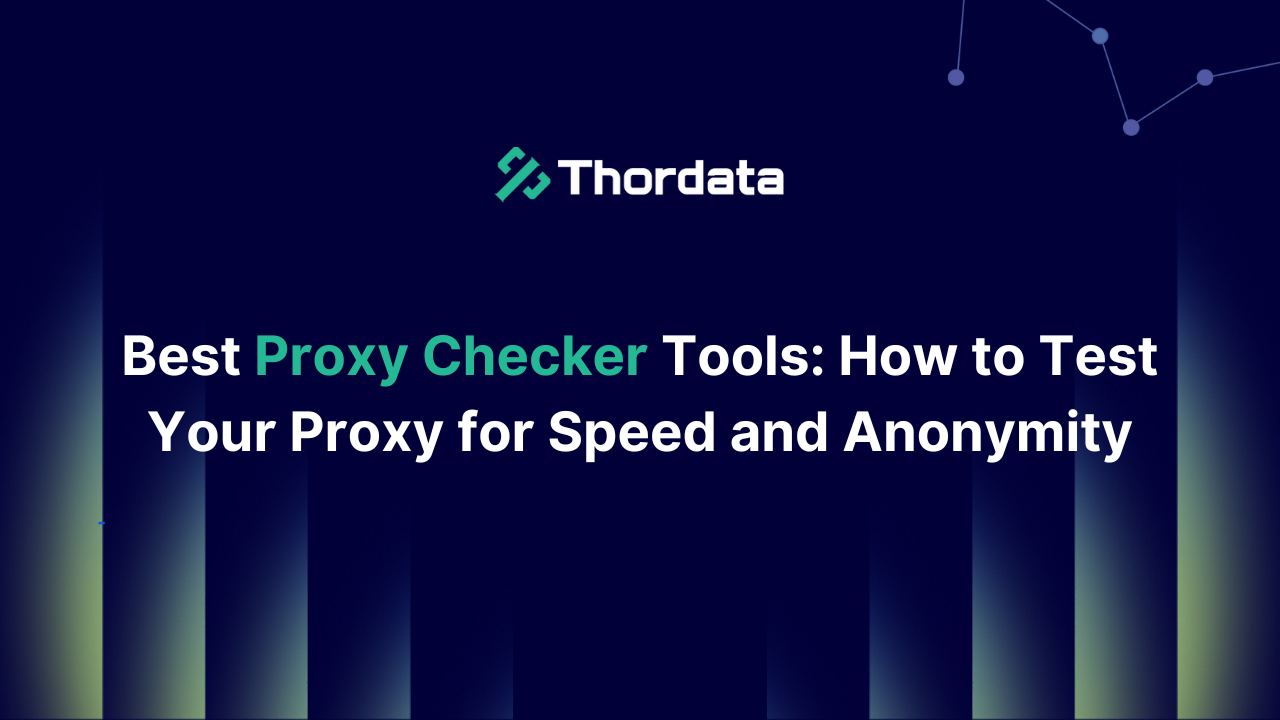Best Proxy Checker Tools: How to Test Your Proxy for Speed and Anonymity


In an era where online privacy and unrestricted access to content are paramount, proxy servers have become indispensable tools. They act as intermediaries between your device and the internet, masking your IP address, bypassing Geo-blocks, and enhancing security. However, not all proxies deliver on their promises. Slow speeds, leaks, or misconfigured anonymity settings can undermine their effectiveness. This is where proxy checker tools come into play. In this comprehensive guide, we’ll explore how to test your proxy for reliability, speed, and anonymity, and review the top tools to help you do it right.
In this guide, we’ll explore: what a proxy checker is, why use Proxy Checkers, key features of a good proxy checker, the top 5 best proxy checker tools (free & paid), and how to test if your proxy is working properly.
What Exactly is a Proxy Checker?
A proxy checker is a tool that checks the operational status of a proxy server, assigns a speed rating to it, and assesses the degree of anonymity. Whether you are utilizing a proxy server utilizing the HTTP protocol, an HTTPS proxy, or a SOCKS-specific proxy, a quality proxy checker will assist you in keeping your connection protected.
Why Use a Proxy Checker?
The fact that you are using a proxy server does not mean that it is operating correctly. A malicious, insecure, or improperly configured proxy server could expose your real IP address, slow down your connection, or make you vulnerable to other actors. Proxy checkers are diagnostic tools that will allow you to do the following:
1. Verify that you are using a proxy (you would be surprised to learn that many people are unaware that their proxy is not operational).
2. Assess speed (latency) to determine if your proxy will create a bottleneck.
3. Determine if there could be IP leaks or DNS mismatches that could compromise anonymity.
4. Check that the proxy’s geo-location is where you require it to be. Without verifying these details, you are taking a risk on your own privacy, wasting time and potential with an unreliable proxy, or we could compromise the ethics behind your web scraping or SEO optimization solution based around the possible illegal use of your proxy services.
Key Features of a Good Proxy Checker
When researching proxy-checker services or tools, remember to investigate the following features:
1. Speed Testing
Latency is measured in milliseconds and denotes how fast your proxy is responsive. High latency will produce sluggish browsing or unfulfilled data requests. Choose a tool or checker that allows you to test an array of speed across multiple servers or regions.
2. Anonymity Testing
Proxies provide anonymity based on their headers (transparent, anonymous, or elite). Elite proxies protect both your IP address and conceal the fact that you are using a proxy. Checkers should produce a signal for leaks for the following:
WebRTC: the Internet protocol that governs communications (most commonly found in browsers) and documented to leak an IP address from your proxy connection.
DNS Requests: check that the DNS from your ISP is not being leaked.
HTTP Headers: verify that your real IP address will not be traceable.
3. Geolocation Verification
If you are simply using a proxy server to bypass geo-blocking by various platforms (e.g. Netflix, DisneyPlus, etc.), then it is important to verify that the location of your proxy is the geo-location that would be required. Higher-end checkers obtain the necessary information to link against services such as MaxMind or other IP databases.
4. Multi-Protocol Compatibility
It is best that the proxy checker will function with all types of protocols, specifically HTTP, HTTPS, or SOCKS5 proxies.
5. Bulk Testing
Manage large proxy lists efficiently by testing multiple IPs simultaneously.
Top 5 Best Proxy Checker Tools
Here are the best tools to test your proxies in 2025:
1. ProxyCheck.io
Features: Tests HTTP/S and SOCKS proxies. Measures latency and response codes. API integration for automated checks. Geolocation and anonymity reports.
Best For: Developers and businesses needing API support.
Pricing: Free for 100 checks/day; paid plans start at $20/month.
2. IPQualityScore
Features: Detects proxies, and Tor exit nodes. Fraud prevention scoring (identifies high-risk IPs). Bulk testing with CSV exports.
Best For: Security-focused users and fraud detection teams.
Pricing: Pay-as-you-go from $0.005/request.
3. WhatIsMyIP Proxy Check
Features: Simple, no-frills interface. Checks for DNS leaks and WebRTC vulnerabilities. Provides detailed reports on proxy type and location.
Best For: Quick, one-off tests for casual users.
Pricing: Free.
4. HideMy.name Proxy Checker
Features: Bulk testing for up to 500 proxies at once. Speed ranking and anonymity verification. Supports SOCKS4/5 and HTTP/S.
Best For: Managing large proxy lists for SEO or scraping.
Pricing: Free with registration.
5. CheckerProxy.net
Features: Open-source community-driven tool. Tests uptime, anonymity, and speed. Historical data on proxy reliability.
Best For: Budget-conscious users and transparency advocates.
Pricing: Free.Conclusion
How to Test Your Proxy: A Step-by-Step Guide
Follow these steps to validate your proxy:
1. Gather Proxy Details
Collect the proxy’s IP, port, username, and password (if applicable).
2. Run a Basic Connectivity Test
Use a tool like WhatIsMyIP to confirm the proxy is live. If the tool shows the proxy’s IP (not yours), it’s working.
3. Check for Anonymity
Visit IPLeak.net or BrowserLeaks.com to detect WebRTC or DNS leaks. If your real IP appears, switch to a higher anonymity proxy.
4. Test Speed
Use ProxyCheck.io or HideMy.name to measure latency. For optimal performance, aim for <200ms.
5. Verify Geolocation
Confirm the proxy’s location using IP2Location or the checker’s built-in geolocation feature.
6. Bulk Test (If Needed)
Upload your proxy list to CheckerProxy.net or HideMy.name to filter out dead or slow IPs.
Conclusion
Proxy checkers are non-negotiable for anyone relying on proxies for privacy, scraping, or accessing restricted content. Free tools like CheckerProxy.net and WhatIsMyIP are great for individual use, while ProxyCheck.io and IPQualityScore offer advanced features for enterprises. Regularly testing your proxies ensures they deliver the speed, anonymity, and reliability you need. Whether you’re a casual user or managing thousands of IPs, investing time in proxy validation pays off in seamless, secure browsing.
Pro Tip: Rotate your proxies periodically and re-test them to maintain peak performance. After all, even the best proxy is only as good as its last check.
Frequently asked questions
What happens if I don’t use a proxy checker?
Your real IP may be leaked, leading to slow connections, triggering anti – crawler mechanisms, endangering privacy, and affecting network operations.
Can I rely solely on free proxy checker tools?
Free tools are suitable for basic checks, but lack advanced features. You may need to combine paid tools in complex scenarios.
How often should I test my proxies?
If you use proxies frequently, it is recommended to test them daily or before each major task. Also, test immediately after proxy rotation.
About the author
Olivia is a content manager at Thordata with a strong passion for the tech industry. With diverse experience across various roles in the field, she particularly enjoys distilling complex ideas into clear, engaging content. Beyond her professional pursuits, she finds joy in creative and active hobbies such as painting, jogging, and traveling.
The thordata Blog offers all its content in its original form and solely for informational intent. We do not offer any guarantees regarding the information found on the thordata Blog or any external sites that it may direct you to. It is essential that you seek legal counsel and thoroughly examine the specific terms of service of any website before engaging in any scraping endeavors, or obtain a scraping permit if required.